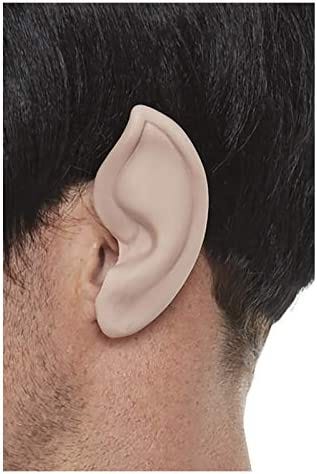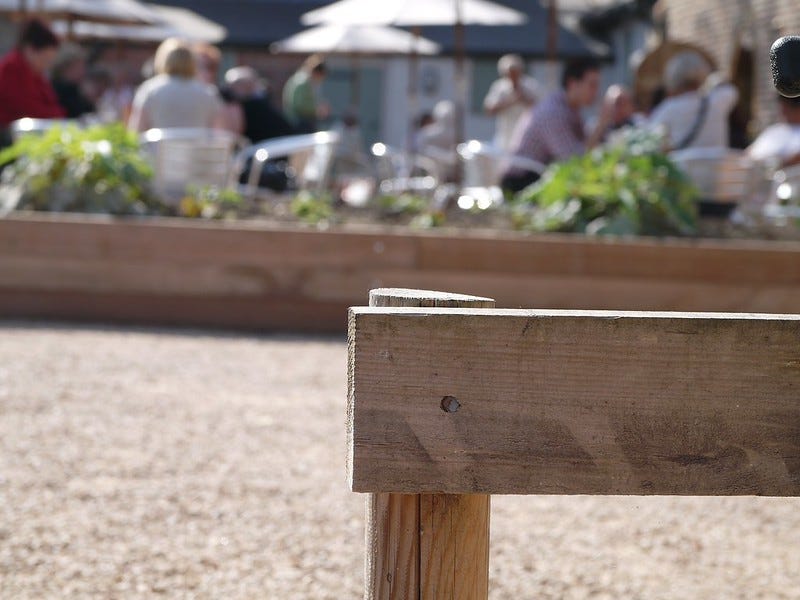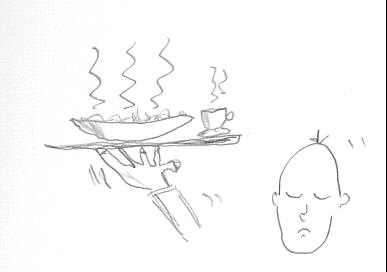Ever since I was about 12 years old, I’ve loved cafés. My parents had a shop in a market, and I’d help them out. In my breaks, or when they didn’t need me for a while, I’d repair to the café, where I’d sit quaffing a milky coffee, eating hot buttered toast, and reading a Superman or Batman comic. Bliss!
I still recall the thrill I had when, instead of saying to the café worker “Milky coffee and two slices of toast, please”, I said, “The usual, please.”!
This habit has continued well into my adult life, except that these days I’m more likely to be reading a magazine, a book or a graphic novel (so much more high brow than a comic!). Or writing. I love writing in cafés.
But for now I’d like to focus on just three of the many cafés I’ve frequented over the years.
The donut palace
It’s around 1975, and a new eatery has just opened right next to the apartment block in which I live. It’s swanky. It sells milky coffees. It sells donuts, spelt the American way. It sells escapism!
Unfortunately, it never had any atmosphere. Or, rather, the atmosphere it did have was a pretty depressing one. I like a café where there’s a buzz, an excitement, a burble of voices, snippets of conversation, the odd crash of a plate falling to the floor followed by the inevitable cheer and cries of “Well done!”. But in the donut palace there was just a tangible nothingness.
I put this down to the nature of the clientele, which seemed to be made up of two kinds of people. Bus drivers, who would nip in for a quick coffee or a cigarette. This was, of course, before the days when buses had GPS and the powers-that-be knew exactly where they were and where they should be, with the precise location and the precise timing.
The other type of customer seemed to be society’s outcasts, the loners, the kind of people you encounter in Ralph McTell’s Streets of London:
Each tea lasts an hour,
And he wanders home alone.
I think that is such a marvellous line. It epitomises a certain kind of loneliness, and hopelessness. But the only exposition of loneliness is the last word: a wonderful example of ‘show don’t tell’.
At one point the owners of the Donut Palace decided to refurbish the place. It was closed for three months. It reopened to a huge fanfare. The outside had been given a fresh lick of paint. The inside sported gleaming new tables, chairs and general decor.
The very next day the same clientele were back. The same people, sitting in the same places they did before. I suspect if I went there tomorrow they would still be there, or perhaps their descendants.
For some reason, the Donut Palace — which was still there (with the same people or people like them) when I last visited the area a few years ago — became the café equivalent of the last chance saloon. It was almost the embodiment of that line from the Ralph McTell song.
The Terminus Café
In my very first proper job, as a teacher, I was living in a flat in a three storey block. I was on the ground floor, Don lived in the middle floor, and Greg lived on the top floor. We all worked at the same school, and Greg and I struck up a friendship. I suspect our affinity was due to the fact that, even then, I had a rather disdainful view of management. Yes, I was ambitious, but was not prepared to become a boot-licker for the purpose of achieving my aims. Greg was the same.
A stone’s throw from where we lived, and near the tube station, was the Terminus Café. I always thought of it as the terminal café, mainly (again) because of the clientele. Or some of them at least.
Greg and I often met up there after work, to have a cup of tea and something to eat. Greg was there when I raced in full of excitement at having discovered a shop, on the way home from work, that sold Mr Spock ears.

I’d glanced in the shop window, seen the ears, and knew that that was what had been missing from my life. Even funnier than the fact of the ears was the seriousness with which the proprietor sold them to me:
Me: May I have a pair of your Mr Spock ears please?
Proprietor: Certainly, Sir. Would you like a bag for them, Sir?
Me: No thank you.
Proprietor: Right you are, Sir. That will be 20 pence please.
Well I thought that was a bargain, and evidently so did Greg because, when I showed him the ears he asked me where I’d bought them, looked at his watch, and exclaimed, “I could just make it before they close!”. He gulped down the dregs of his tea and rushed out.
(The next day, back in school, I opened my briefcase, having forgotten that I’d put the ears in there. One of the boys at the front of the class looked, nudged his friend, and whispered, “He’s got a pair of ears in his case.” His friend looked suitably shocked.)
And Greg was there on the day I slouched in, having written off my car on the way home. Sympathy and tea were the order of the day then. (Though I seem to recall I had to pay for the tea myself. Sigh.)
Every so often there would be “an occurrence”. On one occasion, Greg and I were chatting, when the man at the next table had a poached egg delivered to him.
Man to Greg: This egg’s cold.
Greg. Oh, right.
Man: It’s cold, innit?
Greg: OK.
Man: How am I expected to eat cold eggs?
Greg: Why don’t you —
Man: Go on, taste a bit.
Greg: No thank you.
Man: It’s cold.
By this time I was a quivering wreck trying to suppress my laughter.
Another time, there was a woman, who I think was talking to a friend on another table, saying, in a really loud voice, things like:
“Cold today, eh?”
“Lovely and warm it was yesterday.”
“No two days are the same, that’s what I always say.”
That was just so much background noise, but all of a sudden the man at a table adjacent to ours starting muttering:
“Oh shut up, you old bag.”
Then, slightly louder,
“For Gawd’s sake, put a bleedin’ sock in it.”
Then, loud enough for the lady to hear, and everyone else,
“Shut up, you old hag!”
Cue the start of a massive argument, carried out at full volume, between the two of them.
But all the while this was going on, everyone else just carried on quietly with their tea and conversations.
The waiter. I never knew his name, but I was certain that he’d been trained in the Ritz or the Savoy, because he used to glide along, his tray held aloft, impervious to any arguments that might be raging across the room.
Here’s a picture of him:
I left the job, vacated the apartment, and lost touch with Greg.
By one of those strange instances of circularity that life sometimes conjures up for us, 25 years later, in what turned out to be my last proper job before going freelance, I found myself working in an office more or less opposite the Terminus Café. Only it was no longer there, its place having been taken by an estate agents,
A terminal café indeed.
The best café of all
Every year, before the pandemic, I went to an education technology show in London. Quite often, I’d be invited to join a company or an organisation for the Awards night. This was a black tie affair, with a top comedian as compere, music, a lavish dinner and, of course, awards.
I usually accepted an invitation, because it was a privilege to be invited. Although, I wouldn’t say I wholeheartedly relished the prospect. I always enjoyed my time there for the most part, but I was always pleased to go back home afterwards, sitting on the tube either watching life go by or reading a book. I found the event quite noisy, and in any case I find that even at family occasions I need to escape for ten minutes or so now and again, to just be quiet and on my own for a bit.
The award ceremony itself was, frankly, unbearable. I mean, full kudos to the companies and individuals who were the recipients, but the announcements seemed to drag on forever. Indeed, on one occasion the comedian Jo Brand was doing it, and at one point she paused and said to the audience:
“Does this go on for much longer? I’m starting to lose the will to live!”
I live in East London, and the technology show was, until 2013, held in west London. The journey each way took around an hour, usually crammed in a train carriage with hordes of other people. Well, one year I decided to be kind to myself. One of the benefits of being a member of the Society of Authors back then was a good rate for a room in one of the London clubs: the equivalent of a four star hotel room at about a third of the price. I decided to stay over for a few nights. The room was about a 15 minute bus ride from the venue, and, if necessary, I could have walked it in around half an hour.
At around 6pm on the evening of the awards dinner I received a phone call. Someone had a spare ticket, and was inviting me to join her and her colleagues. That was very nice of them, but I did a quick mental calculation. To get home would take an hour. Even if I showered and changed at super-speed, I would still be unlikely to arrive before 8pm — an hour late.
I did momentarily consider asking Elaine if she could meet me halfway, with the dinner suit. I’d change in a station toilet, and then go to the event. But that wouldn’t have been fair on Elaine, and in any case I’d been in a crowded hall all day: I wanted to freshen up properly. So I reluctantly had to decline the invitation.
An hour later I was sitting in a café, accompanied by the Evening Standard newspaper. There was one other person there. It was like Edward Hopper’s painting Nighthawks, though not as crowded.
I looked at the Starbucks across the street, full of people chatting animatedly.
I looked at the street outside the window, full of commuters and nightbirds bustling past.
I thought of the awards ceremony, with its loud music and straining to hear, and be heard, over the music.
I looked at the other person in the café, and I thought of myself with my Evening Standard.
And I savoured the silence.
It was delicious.
I hope you enjoyed that article. I uploaded it to Google’s AI program called Notebook LM. It generated a summary, and a podcast. The podcast discussion is remarkable, because it sounds so real: it isn’t! I first revealed this amazing tool in a post for my paid subscribers:
Here’s the summary, followed by the podcast. Let me know what you think.
Summary
This text explores the author's lifelong love of cafes, specifically focusing on three cafes that hold significant meaning for them. The author describes the "Donut Palace," a cafe with a depressing atmosphere frequented by bus drivers and lonely individuals, the "Terminus Cafe," where they would meet a friend after work and share memorable experiences, and a nameless cafe they found solace in during an awards ceremony. The author contrasts the bustling atmosphere of other cafes with the peace and quiet they found in this last cafe, reflecting on the power of silence and solitude.
Music by Paolo Argento from Pixabay








Such great stories, Terry. You still have the ears, right?
I prefer to withdraw from rather than engage with noise and people, and for this reason your last six lines have really resonated with me. I'm saving this post so I can keep them to reflect on!
I am glad Rebecca pointed me in the direction of this post. I should dig around in the archive more! I am sure there is much more treasure to be found.